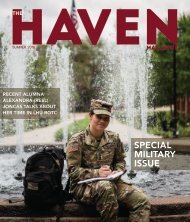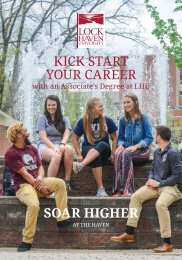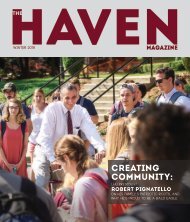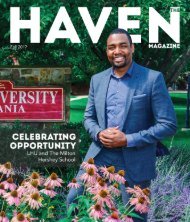The Haven Magazine Spring 2018
You also want an ePaper? Increase the reach of your titles
YUMPU automatically turns print PDFs into web optimized ePapers that Google loves.
access the specialty care they need,<br />
despite their rural location. Many<br />
physicians and PAs are teleconferencing<br />
with patients to review cases. <strong>The</strong>y<br />
have the ability to view live video<br />
images and review photos. In more<br />
serious cases, many regional hospitals<br />
are utilizing telemedicine in their ICU<br />
departments to connect with rural<br />
hospitals and provide guidance and<br />
consultation to nurses and PAs on staff<br />
in those locations.<br />
Students in LHU’s program are<br />
exposed to these models of care<br />
delivery through their experiences<br />
in the classroom and, especially,<br />
their practical experiences. “Our<br />
students are directly participating in<br />
these models of care as part of their<br />
experience in the program.”<br />
“It’s true hands-on<br />
preparation for<br />
the evolving<br />
technologies they<br />
will utilize as<br />
care providers in<br />
the future,” says<br />
Eisenhauer.<br />
Associate Professor Eric Lippincott talks with athletic training students about new<br />
technologies being utilized by the program.<br />
utilizing evolving technologies<br />
has become a key component<br />
of the curriculum in LHU’s<br />
athletic training program. According<br />
to Athletic Training Associate Professor<br />
Eric Lippincott, staying connected with<br />
students engaged in the internship<br />
phase of their coursework is an<br />
essential part of the program. “Our<br />
senior level students take part in<br />
intense, semester-long internships and<br />
it’s crucial for them to stay connected<br />
to one another, and to the faculty,” says<br />
Lippincott.<br />
<strong>The</strong> program utilizes Zoom video<br />
meeting technology to connect<br />
with students and check in on their<br />
internship progress. He says, “We<br />
have students located across the<br />
country, from New England to Missouri.<br />
Maintaining face-to face interactions<br />
with one another, and the faculty,<br />
helps them connect back to LHU. Plus,<br />
it’s really important for them, and for<br />
us, to discuss what they’re learning,<br />
the interesting cases they’re seeing,<br />
and then have an opportunity to tie<br />
that back to what they learned in the<br />
classroom.”<br />
LHU’s athletic training program utilizes<br />
a cohort model which allows students<br />
to develop a close bond as they move<br />
through their courses together. “<strong>The</strong><br />
cohort model helps students maintain<br />
peer-to-peer connections. That has<br />
been well received by students,<br />
especially when it comes time for their<br />
internship semester,” Lippincott shares.<br />
Prior to the internship phase of their<br />
coursework, athletic training students<br />
prepare for the field with the latest in<br />
technology. “We utilize technology in<br />
the classroom in a number of ways,”<br />
says Lippincott. One tool available<br />
to students is the Balance Master<br />
which is used to assess balance and<br />
perform balance exercises, specifically<br />
with patients who have sustained a<br />
concussion.<br />
According to Lippincott, LHU students<br />
are able to learn with equipment that<br />
is the gold standard in the athletic<br />
training field. “Our students are<br />
learning with cutting edge technology.<br />
Athletic training is a medical field<br />
and our students have to stay up<br />
to date with the latest in diagnostic<br />
and treatment tools.” Unlike larger<br />
programs, LHU students have the<br />
opportunity to work directly with<br />
patients and use these technologies<br />
early in their coursework. “I think it<br />
gives our students a real advantage<br />
when they leave here,” says Lippincott.<br />
“<strong>The</strong>y go into the field<br />
knowing how to use the<br />
latest in technology.<br />
Plus, during their time<br />
as student trainers<br />
they are the ones doing<br />
the hands-on work. It<br />
gives them the skill<br />
set they need to be<br />
successful in their<br />
first job.”<br />
He shares that many athletic training<br />
graduates go on to jobs where they<br />
are the only medical professional on<br />
the field. “Many graduates quickly<br />
find themselves in situations where<br />
they are evaluating and making return<br />
to play decisions. <strong>The</strong> resources and<br />
10 SPRING <strong>2018</strong> THE HAVEN LOCK HAVEN UNIVERSITY











